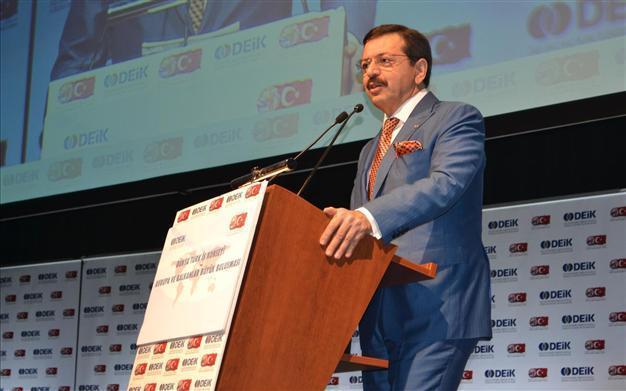Turkish government to manage foreign trade body, open market under moot
Ali Kayalar ANKARA

Rıdat Hisarciklıoğlu, head of Union of Chambers and Commodity Exchanges of Turkey (TOBB), is seen making a speech during a conference held by the Foreign Economic Relations Board (DEİK). Previously operating under TOBB, DEİK has been put under the control of the Economy Ministry. AA Photo
A specific item in an omnibus law approved at Parliament in the early hours of Sept.10 will apparently reshape Turkey’s efforts to boost international trade, while also triggering a new debate on “free enterprise” and the “open market.”
The item puts the Foreign Economic Relations Board (DEİK), an arm of the Union of Chambers and Commodity Exchanges of Turkey (TOBB), under the control and surveillance of the Economy Ministry, which, according to many, signals stronger government control on imports and exports.
Sources close to the issue have told the Daily News that this is an open attempt to hand the foreign trade ropes over to the ministry, also adding that a regulation to match with the code was awaited to see the details of to which scale government intervention would go.
“This looks like a violation of the principle of the open market,” a high-ranking foreign trade source said.
The DEİK is the larger of two basic private bodies that join local efforts to improve foreign trade, with the Turkish Confederation of Businessmen and Industrialists (TUSKON) being the other.
TUSKON, founded in 2005, has played a role in diversifying Turkey’s exports, mainly to African countries and Latin America, at a time when such a move was vital due to the crisis in the eurozone, the largest destination for Turkish exports. However, TUSKON has always remained rather small when compared to the DEİK, which has prominent global and local business leaders on its board and councils.
Besides, TUSKON’s credibility with the government did not last long, mainly due to its alleged ties to the Gülen movement, which has been at odds with the government since December 2013, following a large graft probe. President Recep Tayyip Erdoğan, who was the prime minister at the time, accuses the Gülenists of attempting a plot to overthrow the government.
The DEİK will now be working with the ministry and its related agencies in planning and implementing its activities, according to the new code. The organization was established in 1986 upon the directive of the prime minister of the time, Turgut Özal, a hardcore liberal in terms of economy policy. Having assumed the duty of “managing the foreign economic relations of the Turkish private sector,” the DEİK had 750 member companies, 42 founding institutions, 115 business councils, 148 commercial and/or industrial chambers and commodity exchange representatives and three foreign representations as of November 2013.
The source said Nihat Zeybekci, the new economy minister who took over the post from Zafer Çağlayan, one of the ministers who lost their seat after the December graft probe, wants more direct access to foreign trade. The Economy Ministry traditionally deals with foreign trade, with Deputy Prime Minister Ali Babacan heading a council of ministers involved in economy and finance.
The DEİK’s change in status has been a recent matter of concern over the economic tendencies of the ruling Justice and Development Party (AKP), which gained a large approval domestically and internationally, especially from “liberals.”
